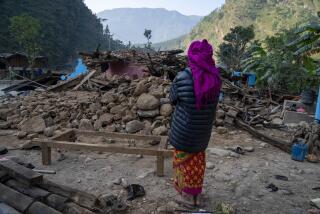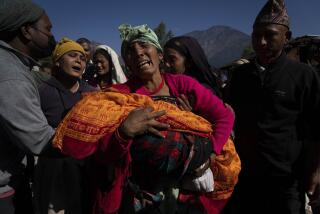In Kashmir, a Tiny Basket Links Lives on the Edge
- Share via
BARANI, Pakistan — Dressed in a white turban and flowing, blue robe, Amraz Khan climbed into a small, steel basket suspended 400 feet above the Jhelum River. As the contraption swung in a stiff wind, he and another passenger pulled on a rope for a nail-biting ride to the river’s far side.
The white-bearded Khan offered a tip on how he keeps his wits about him. “I do not look down -- ever,” he said.
Before the devastating Oct. 8 earthquake, numerous bridges spanned the deep gorges the Jhelum has carved into the dusty landscape here in Pakistanicontrolled Kashmir. Some could handle a small vehicle, and others were merely suspended walkways.
Now, many bridges are gone or have been declared unstable. A few others hang precariously by single cables, marooning this isolated village.
For many, the only way across is the rassa, the risky contrivance Khan took to visit quakeinjured relatives across the waterway.
In the local Punjabi dialect, rassa means “strong rope.” The pulley device near Barani was built in 2000, a single steel cable anchored in two slabs of concrete on either side of the river, 700 feet apart. Kashmiris have used such pulley cars for decades to span the Jhelum and other rural rivers.
But since the quake, the passenger volume has tripled, turning the rassas into critical lifelines. Hundreds of residents of Barani and the two nearby villages were killed or injured in the quake. Survivors used the pulley bridge to haul out the wounded. Then they brought out the dead, one by one.
Today, residents use the rassa here to transport relief aid and water. The alternative is to walk six miles to the nearest standing bridge.
There has been only one injury. Days after the quake, five men crowded into the basket designed for only two riders. Halfway across, one dropped into the raging waters below, barely surviving the plummet.
During the wind and rain, only the bravest venture over the river.
“Sometimes I cannot believe I am in this chair,” said Altaf Hussain, 32, a Barani resident. “But we have no choice. People have fought for the rassa.”
The pulley bridge even has its rush hours -- mostly in the early morning, when the wait can last three hours.
Dusk is also busy, when residents wait anxiously to cross. Darkness, they know, sharpens their senses, heightening the roar of the river below.
The unwise few who embark alone with heavy loads often get stuck over the river, unable to pull themselves to the other side unaided. They have to wait, suspended in midair, until someone arrives on shore to help them to safety.
One afternoon, Magini Bibi arrived at the rassa with two jugs she had filled at a nearby waterfall. The mother of two lost her daughter in the quake and carried the child’s body out in the metal basket.
She warns her only surviving child not to take the crossing lightly. “I tell him to stay cool and calm when he crosses,” she said. “Don’t pull the rope very fast. And no monkey business! I have already lost one child.”
When the rassa is too crowded, some residents hike to a nearby footbridge that provides a similar thrill. One of the span’s cables has snapped, and its wooden walkway lists sideways over the water.
Sarwar Shah, 55, watched as several youths inched their way, stepping gingerly across the corkscrewed bridge and keeping an eye on the river a few feet below.
“This is a young man’s game,” he said, shaking his head. “Not for grandfathers like me.”
Back at the rassa near Barani, Mohammed Sharif waited his turn.
“After the quake, we used it to take our wounded relatives to the hospital,” he said. “The rassa has saved lives. But it has yet to take one.”
More to Read
Sign up for Essential California
The most important California stories and recommendations in your inbox every morning.
You may occasionally receive promotional content from the Los Angeles Times.














